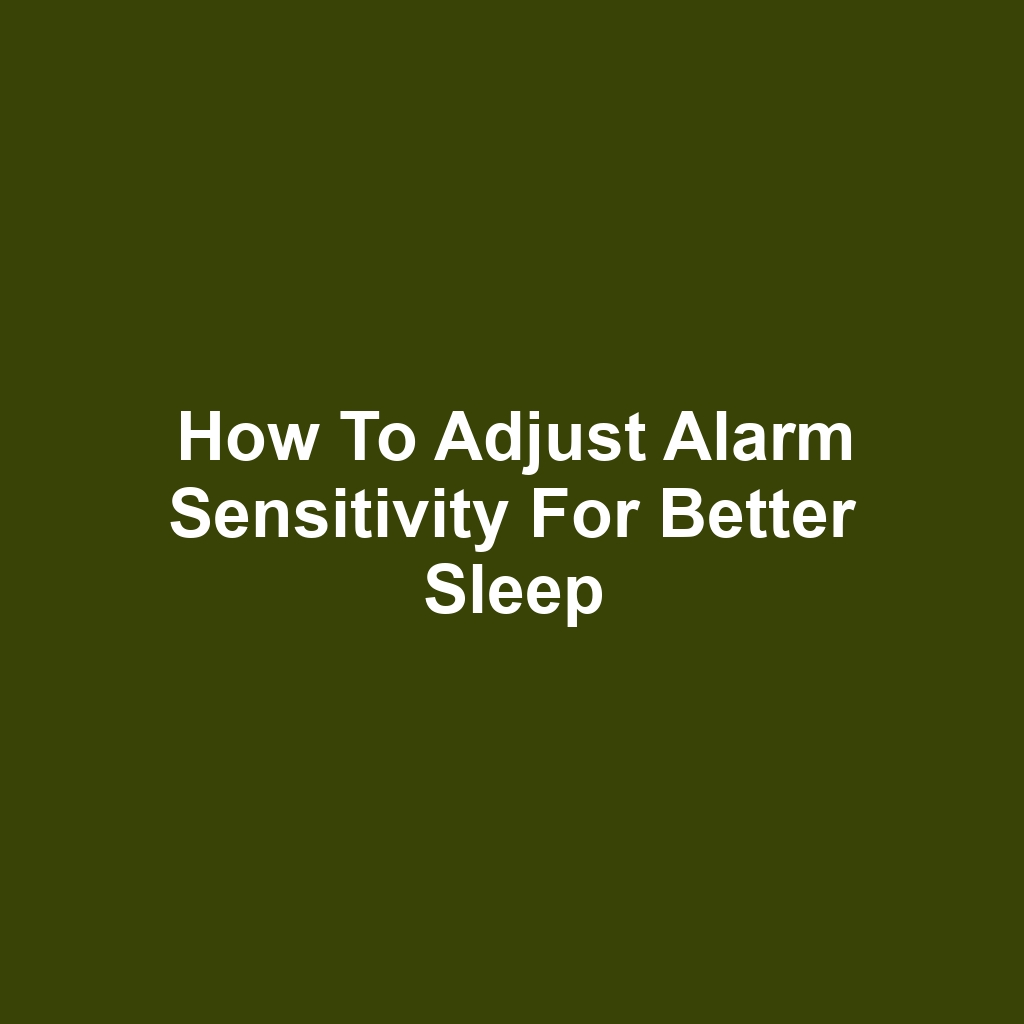I’ve always struggled with finding the right balance when it comes to alarm sensitivity. Sometimes, I wake up feeling groggy because my alarm’s too loud, while other times, I miss it altogether when it’s too soft. I’ve realized that adjusting the alarm sensitivity can significantly impact my sleep quality and overall well-being. In this article, I’ll explore various factors that influence my sleep and share techniques that have worked for me. By the end, I hope you’ll find a method that helps you wake up refreshed and ready for the day.
Understanding Alarm Sensitivity
Understanding alarm sensitivity is crucial for ensuring that I wake up feeling refreshed rather than jolted awake. I’ve noticed that a loud alarm can startle me out of deep sleep, leaving me groggy. On the other hand, if it’s too soft, I might sleep right through it. I’ve experimented with different tones and volumes to find the right balance. Sometimes, a gentle chime works better than a blaring sound for me. I’ve also learned to set my alarm at a time that aligns with my sleep cycles. It helps me wake up during a lighter sleep phase. I find that using gradual volume increases can be less jarring. Ultimately, it’s about discovering what uniquely suits my sleep patterns and preferences.
Factors That Influence Your Sleep Quality
Sleep quality’s affected by various factors, and I’ve noticed that even small changes in my environment can make a big difference. For instance, the temperature in my room plays a crucial role; if it’s too hot or cold, I struggle to drift off. I’ve found that noise levels also matter; even subtle sounds can pull me out of deep sleep. My mattress and pillows impact how well I rest, so I’ve invested in comfortable bedding that suits my preferences. I’ve realized that my pre-sleep routine can set the tone for how easily I fall asleep. When I limit screen time before bed, I wake up feeling more refreshed. I’ve also noticed that my stress levels throughout the day influence my sleep quality at night. Staying hydrated helps, but too much fluid before bed can lead to frequent trips to the bathroom. Lastly, I try to keep a consistent sleep schedule, which has significantly improved how I feel in the morning.
Techniques to Modify Alarm Volume
Adjusting the alarm volume has really helped me find a better balance in my morning routine. I used to wake up feeling startled and disoriented because my alarm was too loud. Now, I’ve set it to a gentler tone that gradually increases. This way, I can ease into waking up instead of being jolted awake. I’ve also started using different sounds for different days, which makes it more interesting. Sometimes, I’ll choose nature sounds or soft music to start my day positively. I’ve discovered that a lower volume can still wake me up if I’m in the right sleep cycle. I’ve even experimented with placing my phone across the room, forcing me to get up to turn it off. Overall, these small adjustments have made a significant difference in how I feel each morning.
Choosing the Right Alarm Type for Your Needs
Choosing the right alarm type really makes a difference in how well I wake up. I’ve tried everything from traditional clock radios to smartphone alarms. Each option brings its own set of features that can either help or hinder my morning routine. I often find myself leaning towards gradual wake-up alarms that start softly and increase in volume. When I use a vibrating alarm, it can be a game changer, especially on those groggy mornings. I’ve even experimented with nature sounds, which sometimes make for a more pleasant wake-up experience. Sometimes, I’ll go for a simple beeping alarm if I need a real jolt to get out of bed. I’ve learned that the right alarm can impact my mood throughout the day. Overall, finding what works best for me is key to starting my mornings right.
Establishing a Sleep Routine for Optimal Results
Establishing a consistent sleep routine helps me fall asleep faster and wake up feeling refreshed. I usually go to bed at the same time every night, which makes a big difference. I’ve noticed that limiting screen time before sleep really helps me wind down. I often read a book or practice some meditation to relax my mind. Waking up at the same time each morning trains my body to expect it. I find that keeping my bedroom dark and cool enhances my sleep quality. I also avoid caffeine in the afternoon to prevent disturbances at night. Sometimes, I jot down my thoughts in a journal to clear my head before bed. This routine has truly transformed my sleep experience.
If you’re looking to enhance your public speaking skills alongside improving your sleep quality, I highly recommend visiting this webpage on tips for preaching without notes. It offers valuable insights that can boost your confidence and delivery, making your messages more impactful. Exploring this resource could be a great way to complement your journey towards better sleep and effective communication!
